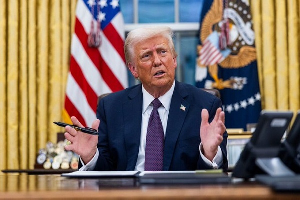GhanaWeb Feature by Mawuli Ahorlumegah
New US President, Donald Trump, has initiated a trade war through the imposition of tariffs on imports from Canada and Mexico, which are expected to have far-reaching consequences beyond North America.
For Canada and Mexico, Donald Trump unleashed 25 percent in tariffs on imports, as well as an additional 10 percent tax on Chinese goods set to come into force on Tuesday February 4, 2025.
Trump said the move was in response to his concerns about illegal immigration and drug trafficking, which are two of the main promises on which he was elected.
While the the immediate effects of this move will be felt in the US, Canada, China and Mexico, African economies, particularly Ghana, could experience indirect repercussions in key sectors such as trade, fuel prices, and food imports.
In October 2024, Ghana's total imports increased to $1,300 million from $1,276.70 million in September 2024, according to data from Trading Economics.
China remains Ghana’s largest import partner, with imports valued at approximately $275.25 million in September 2024, though this marked a decline from $302.44 million in August 2024, as reported by CEIC Data.
The United States also contributed significantly to Ghana’s imports, exporting goods worth $99.1 million to the country in October 2024, based on figures from OEC World.
Fuel prices and energy costs
One of the biggest impacts on Ghana and other African economies could come from rising global fuel prices, as Canada is the largest foreign supplier of crude oil to the US.
In response to these raft measures, Canada has already announced retaliatory tariffs against the US tariffs by restricting exports.
Since US refineries rely on heavier crude oil, mostly from Canada and Mexico, any disruption in supply could lead to higher fuel costs globally.
For Ghana, which imports a significant portion of its refined petroleum products, an increase in global oil prices would drive up transportation and energy costs.
This, in turn, could lead to inflationary pressures, affecting the cost of goods and services across the economy. Higher fuel costs could also impact industries such as agriculture, fishing, and manufacturing, all of which depend on affordable energy for production and distribution.
The auto industry and vehicle prices
Africa, including Ghana, has a high dependency on imported second-hand cars, many of which originate from North America. US car manufacturers rely on a supply chain that involves multiple border crossings between the US, Canada, and Mexico. The imposition of tariffs on auto parts will increase production costs, which will likely be passed on to consumers.
Higher car prices in the US and Canada could lead to a ripple effect in Ghana, where many used vehicles come from these regions.
For instance, importers of second-hand vehicles could face increased costs, making cars more expensive for Ghanaian consumers. In a country where personal vehicles are crucial for business operations and public transport services, this could have widespread economic implications.
Food prices
The tariffs could also drive up the prices of food products, some of which are re-exported to Africa. For example, Mexico is a leading supplier of avocados, a fruit that has become increasingly popular in Ghana, particularly among middle-class consumers and the hospitality industry. If Mexican exporters reduce supply to the US due to the new tariffs, prices could increase globally, making avocados more expensive in Ghana.
Similarly, certain beers and spirits that are produced in North America, such as Tennessee whiskey, tequila, and Canadian whisky, could see price hikes. Ghana’s hospitality industry, including hotels, bars, and restaurants that import these beverages, may have to raise prices, affecting consumer spending and business operations.
Maple syrup, which is a niche but an increasingly sought-after product in Ghana, is primarily sourced from Canada. If tariffs make it more expensive in the US, the effects could spill over to other global markets, including Africa, where importers will likely face higher costs.
Construction sector
Donald Trump’s tariffs on Canadian lumber imports will also have consequences for global construction material prices. Ghana’s real estate and construction sectors rely heavily on imported building materials, including timber, steel, and cement. If North American lumber prices increase, Ghanaian importers may have to pay more for wood-based products, leading to higher construction costs.
This could slow down the real estate sector, affecting both affordable housing projects and large-scale commercial developments. With Ghana already facing a housing deficit of 1.7 million, any increase in building costs could worsen affordability issues for homebuyers and renters.
Impact on global trade and African markets
As the US, China, Canada, and Mexico engage in a trade war, disruptions in global supply chains could shift global trade dynamics. African economies, including Ghana, depend on stable international markets for exports and imports.
If trade tensions persist, there could be reduced foreign direct investment (FDI) in African markets as businesses in North America and Europe will focus on protecting their domestic industries.
Additionally, any slowdown in the North American economy due to the trade war could affect remittances from the Ghanaian diaspora in the US and Canada. These remittances are a crucial source of income for many Ghanaian families and contribute significantly to the country’s foreign exchange reserves. A decline in remittances could weaken the cedi and impact Ghana’s balance of payments.
Conclusion
While Donald Trump's tariffs are primarily aimed at North American trade partners, its resultant effect will be felt across the global economy, including in Ghana and other African nations.
Rising fuel and food prices, increased costs for imported vehicles and construction materials, and potential disruptions in trade and remittances could all impact Ghana’s economic stability.
But in order to mitigate these risks, Ghanaian policymakers and businesses should explore alternative trade partnerships, invest in local manufacturing to reduce import dependency, and strengthen regional integration through initiatives like the African Continental Free Trade Area (AfCFTA).
Finally, as global trade dynamics continue to shift, Ghana must take stringent measures to adapt proactively to safeguard its economy from external shocks.
Meanwhile, watch the latest edition of BizTech below:
Click here to follow the GhanaWeb Business WhatsApp channel
Business News of Monday, 3 February 2025
Source: www.ghanaweb.com

















